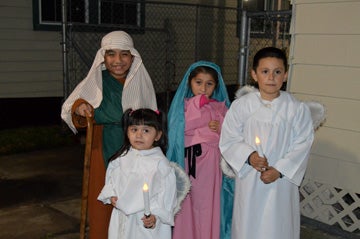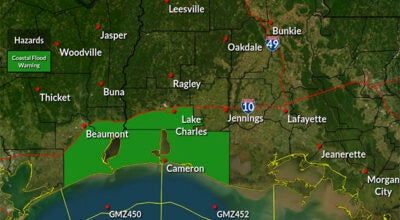Ceremony memorializes no room at the inn
Published 7:41 pm Friday, December 23, 2016

- The tradition of the Posadas was brought to Mexico from Spain in the 1500s by Catholic missionaries, according to Catholic Online. The Posadas commemorate Mary and Joseph's difficult journey from Nazareth to Bethlehem in search of a place for the Christ Child to be born.
Las Posadas is a popular spiritual exercise at Christmastime in Roman Catholic Latin American culture that many in the United States may not be familiar with.
St. Joseph Catholic Church in Port Arthur, however, observes Las Posadas for nine days leading to Christmas Eve.
“It’s a joyful way to prepare for Christmas,” said the Rev. Kevin Badeaux, pastor of the church. “It’s popular in Mexico and originated in Spain.”
Las Posadas means inn in Spanish and commemorates the holy family’s journey in the Holy Land. The account comes from Luke chapter two in which a census was to be taken and Joseph and his family had to return to his hometown of Bethlehem, the city of David, from Nazareth.
“It’s significant whey He was born there in a stable because there was no room,” Badeaux said.
For the Las Posadas ceremony, songs are sung from host house to host house with a procession where the Posada is held. Children dress in costumes of the time from the Holy Land. There’s singing and begging until they are let in.
The event concludes with a Rosary and prayers and children playing with a pinata.
“The Sicilians did something similar for the Feast of St. Joseph. Children would dress up like the holy family and like saints at the St. Joseph Altar. It is called the tupa in Italian which means knocking on the door,” he said.
To Badeaux, Las Posadas is popular spirituality of the faith of the common people that centered on the scriptures and reflects Christ.
The tradition of the Posadas was brought to Mexico from Spain in the 1500’s by Catholic Missionaries, according to Catholic Online. The Posadas commemorate Mary and Joseph’s difficult journey from Nazareth to Bethlehem in search of a place for the Christ Child to be born.
In Spanish, the word means dwelling or lodging. The Posadas begin on December 16 for nine evenings, culminating with the Posada on December 24 and Midnight Mass.
The Posadas are not to be confused with a mere Christmas party. Instead, the Posadas should be seen as a religious event.
In Catholic parishes, parishioners and anyone who wishes to join in meet at the church at a specific time during the early evening.
The Posada begins with the recitation of the Rosary. When a part of the Rosary is prayed by all those who have gathered for the Posada, the group begins to proceed from the church to the local neighborhood.
The Posada can be led by a small group carrying a manger scene or the Posada can become quite elaborate with a live donkey and parishioners who are dressed like Mary and Joseph.
The participants stand before the door of each house and sing a song in Spanish asking to enter the house. A small group remains inside the house telling the outside group that it is impossible to enter.
Another family has been already selected to provide the Posada.
The group proceeds along the street to the Posada house. Again, the Posada group sings from outside of the selected house and a small group sings the response from inside the house where the Posada will take place.
La Posada dinner, provided by the host family, includes such Hispanic dishes as tamales, menudo and posoli. Each Posada ends with the traditional pińata.
The seven corners of each pińata represents the Seven Deadly Sins. The beating of the pińata symbolizes the mortification that Christians exercise in overcoming personal sin. The candy within each pińata characterizes the sweetness of God’s grace made available to us through the birth of Jesus.
David Ball: 409-721-2427





